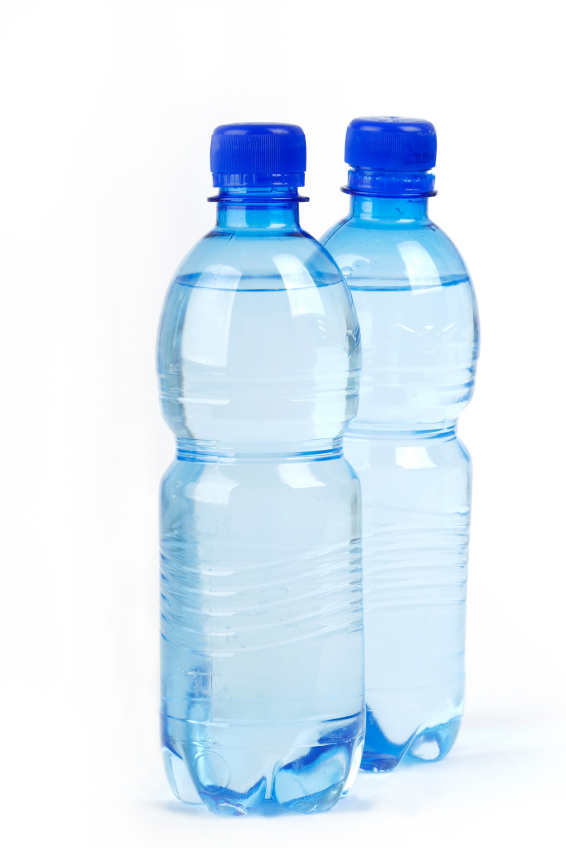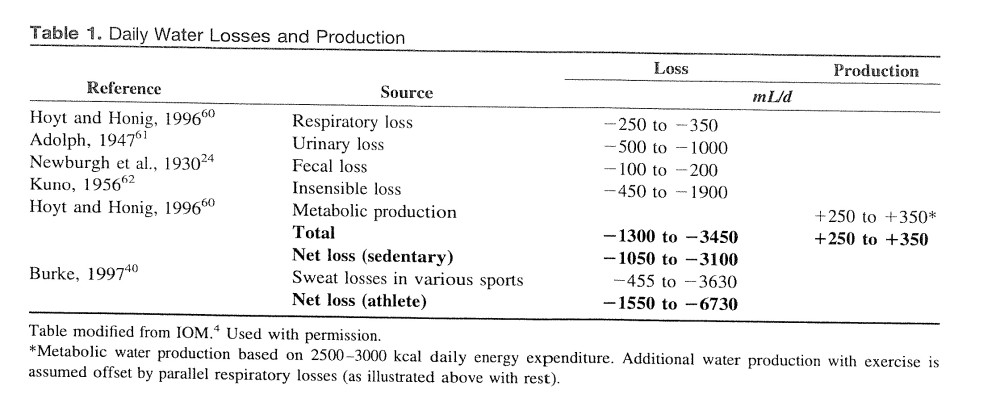Whether you are an inactive individual, a recreational gym member or a high performance athlete, chances are that your water intake is inferior to what it should be, or is so at least part of the day.
Mild dehydration corresponds to a water loss of 1-2% of bodyweight. For a 220lb male, that is just one liter of water. Does that sound a lot? Something you would be aware of? Take a look at the table bellow: (table 1)
(Sawka et al 2005)
The net water loss for sedentary individuals ranges from 1.0 to 3.1L/day, while an athlete is subject to water loss ranging from 1.6L to 6.7L/day. Variation is huge and depends on weather conditions, bodyweight and individual metabolic variables. A general estimate indicates 3.7L/day for men and 2.7L/day for women to meet their needs. That number is not very useful if we consider bodyweight and activity variation. The water requirement of a very active individual (let’s say, a competitive athlete) may be twice that of a sedentary person (Sawka et al 2005).
What is scary is that most of us have already suffered mild dehydration, manifested symptoms and haven’t even been aware of it. A long commuting period can easily lead to mild dehydration. Let’s take a look at the symptoms that characterize this condition:
- Headache, ability to concentrate and alertness (Shirreffs et al 2004)
- increasing frailty, deteriorating mental performance and poor quality of life (Wilson & Morley 2003)
- progressive impairment in mathematical ability, short-term memory and visuomotor function once 2% body fluid deficit was achieved (Gopinathan et al, 1988). Cian et al (2000)
- long-term memory following dehydration resulting from heat stress (Wilson & Morley 2003)
- decrements in visual-motor tracking, short-term memory and attention (Lieberman 2007)
- degraded mood, increased perception of task difficulty, lower concentration, and headache symptoms resulted from 1.36% dehydration in females (Armstrong et al 2012)
- mild dehydration without hyperthermia in men induced adverse changes in vigilance and working memory, and increased tension/anxiety and fatigue (Ganio et al 2011)
- even short periods of fluid restriction, leading to a loss of body mass of 1–2%, lead to reductions in the subjective perception of alertness and ability to concentrate and to increases in self-reported tiredness and headache. In exercise lasting more than a few minutes, hypohydration clearly impairs performance capacity (Maughan 2003)
The biochemical and physiological aspects of mild dehydration are still poorly understood. However, animal model studies indicate that some phenomena might be irreversible (Wilson & Morley 2003), whether if mildly chronic or acutely severe.
Attention is the least of the requirements here. We actually need to be more aware of our water consumption and make sure our requirements are met. Work conditions that prevent us from doing so need to be confronted: not meeting our water requirements and not having access to the restroom accordingly is a health hazard. Long commuting times are a health hazard, period: they have to be managed to happen as infrequently as possible or water/restroom stops have to be planned for.
It is easier to ensure proper water consumption during a training session, if you are an athlete. Sometimes, with a water fountain right in front of you, you still fail and forget to drink water at least every 15 minutes, as you should.
It is impossible to say how much water is right for each person because of the huge number of variables involved. However, if you are an athlete and you are not getting about 25mL/lb of bodyweight, you are probably not getting quite enough.
Like food, it is not ok to get your full supply once and consider it done for the day. It is as stupid to try to drink 3L of water in one hour and forget about it for the rest of the day as blending 3500 calories with 240g of protein, drinking it in the morning and consider your nutrition taken care of. You eat about 5-8 times every day. You shouldn’t drink water less than 10 times.
We would like to think that we helped you to think of water as more than the important, but well known nutrition component that helps you thermoregulate, anabolize, poop and get rid of waste. Water is more than that. If a mild decrease can cause that much havoc in your organism, it’s probably a big deal. It is probably much more than we actually know.
Mild dehydration is defined as water loss of 1-2% of bodyweight and can be easily overlooked. Our everyday life is conducive to mild to moderate dehydration. Mild dehydration results in cognitive impairment and other symptoms.
https://storify.com/mariliacoutinho/mild-dehydration


